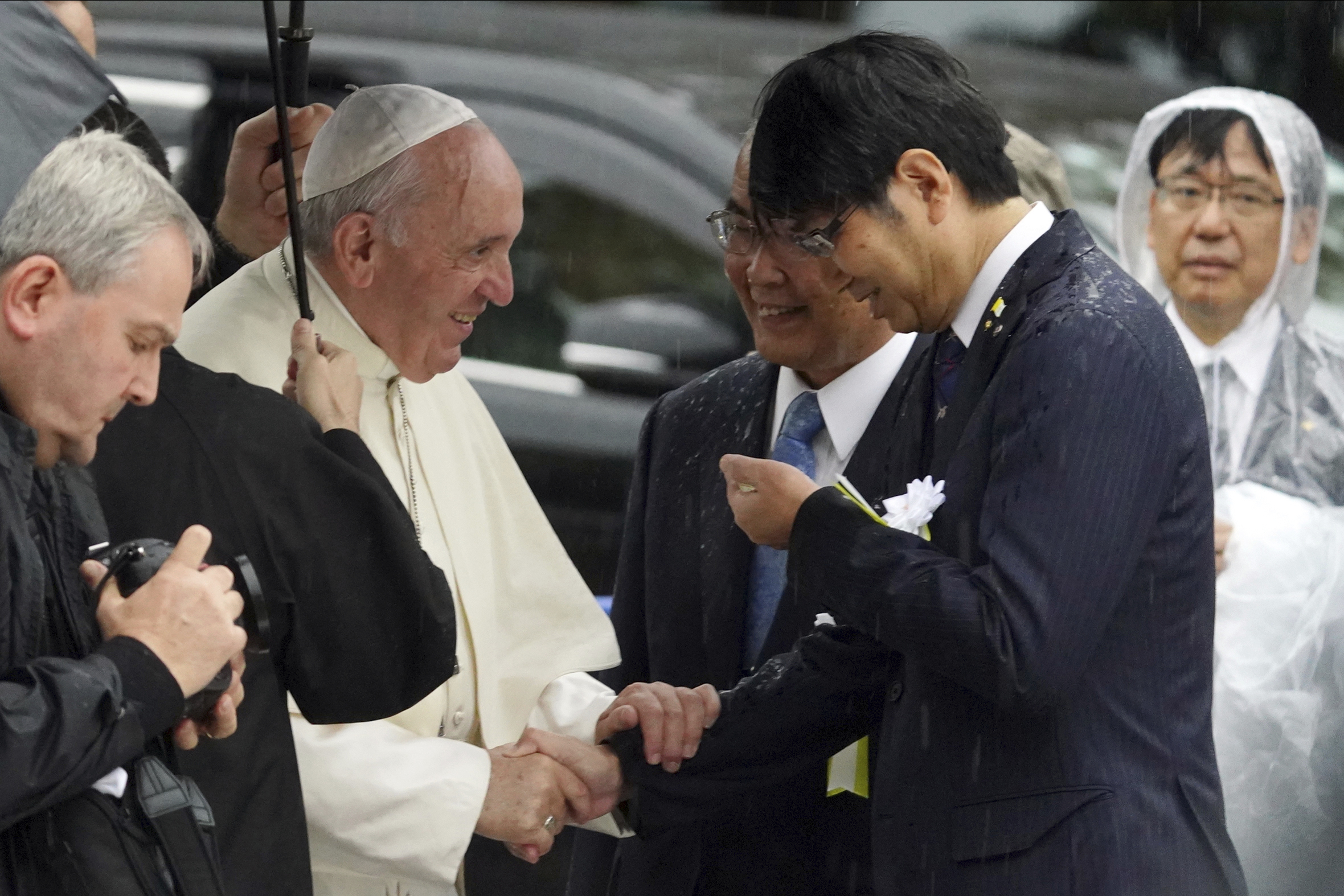Pope in Nagasaki: No to atomic weapons, deterrence doctrine

Pope Francis shakes hands as he arrives at the Atomic Bomb Hypocenter Park, Sunday, Nov. 24, 2019, in Nagasaki, Japan. (AP Photo/Eugene Hoshiko)
NAGASAKI, Japan — Pope Francis demanded world leaders renounce atomic weapons and the Cold War-era doctrine of deterrence, saying Sunday the stockpiling of nuclear arms decreases security, wastes resources and threatens humanity with catastrophic destruction.
Francis made the appeal in Nagasaki at ground zero of the second of the two 1945 U.S. atomic bombings on Japan. After laying a wreath of flowers and praying in the rain at the foot of the memorial to the victims, Francis said the place stands as a stark reminder “of the pain and horror that we human beings are capable of inflicting upon one another.”
“Convinced as I am that a world without nuclear weapons is possible and necessary, I ask political leaders not to forget that these weapons cannot protect us from current threats to national and international security,” he said.
The mood was somber and silent, darkened by the downpour that drenched the terraced fields and rice paddies of Nagasaki and the hundreds of Japanese who came out in plastic raincoats to witness the second pope to pay his respects to victims of the bomb.
Francis visited Nagasaki — and later Hiroshima — at the start of his three-day trip to Japan aimed at emphasizing his call for a global ban on atomic weapons.
The Holy See was among the first countries to sign and ratify the new U.N. nuclear prohibition treaty, and Francis himself has gone further than any pope before him in saying not only the use but the mere possession of atomic weapons is “to be condemned.”
Francis didn’t repeat that condemnation on Sunday, but he argued that stockpiling nuclear arsenals provides a false sense of security and actually reduces global peace at a time of heightened concerns about the nuclear threat from Iran and North Korea.
“Peace and international stability are incompatible with attempts to build upon the fear of mutual destruction or the threat of total annihilation,” he said. “They can be achieved only on the basis of a global ethic of solidarity and cooperation.”
The first U.S. atomic bomb fell on Hiroshima on Aug. 6, 1945, killing 140,000 people. The second one dropped three days later on Nagasaki and killed another 74,000 by the end of the same year, according to data from the two cities. Many of the survivors have suffered the lasting impact of radiation and developed various forms of cancer.
Under the 1957 government law designed to support A-bomb survivors, or “hibakusha,” more than 370,000 people were recognized as eligible for various types of government support, including medical and welfare assistance, depending on how far they were from ground zero.
As of 2018, the total amount the government had spent on them amounted to nearly 5.6 trillion yen ($53 billion), according to the Ministry of Health, Labor and Welfare.
“In a world where millions of children and families live in inhumane conditions, the money that is squandered and the fortunes made through the manufacture, upgrading, maintenance and sale of ever more destructive weapons, are an affront crying out to heaven,” Francis said.
He lamented the “climate of distrust” that is eating away at non-proliferation efforts and the arms control framework, a reference to the formal demise this year of the Intermediate-range Nuclear Forces treaty, a landmark Cold War-era arms control agreement. The U.S. formally withdrew from the treaty in August, after accusing Moscow of developing a Russian missile system prohibited under it.
And he urged world powers to recommit to arms control efforts and the eventual abolition of nuclear weapons.
“We need to ponder the catastrophic impact of their deployment, especially from a humanitarian and environmental standpoint, and reject heightening a climate of fear, mistrust, and hostility fomented by nuclear doctrines,” he said.
Several years ago, Francis was given a photograph of a Nagasaki boy carrying his dead baby brother on his back en route to a crematorium after the bombing. Francis has since distributed tens of thousands of copies of the photo, with the words “The fruit of war,” printed on them.
On Sunday, a poster-sized version of the photo was displayed at the memorial, and Francis was meeting the widow and son of the American military photographer who shot it, Joe O’Donnell.
Japanese who came out to see him were grateful for his pilgrimage and message.
“I think he is a person who can deliver the message of peace without inhibition,” said Negoro Fumiyo, a 62-year-old Christian from Osaka, in western Japan.
Francis’ visit to Nagasaki also gave him the chance to honor Christian missionaries and martyrs centuries after St. Francis Xavier first brought Christianity to the archipelago in 1549.
He laid a second wreath of flowers at the memorial of 26 Nagasaki Martyrs, who were crucified in 1597 at the start of the two-century wave of anti-Christian persecution by Japanese rulers.
The example of the missionaries and martyrs and the Hidden Christians who kept their faith alive underground for generations helped inspire a young priest named Jorge Mario Bergolio to be a missionary in Japan.
In remarks at the memorial, Francis recounted his youthful dream and said Catholics today can learn from the martyrs’ example.
“May we never forget their heroic sacrifice!”
Shingo Fukaura, from the Goto Islands off Nagasaki, where the Hidden Christians survived during the time of persecution, traveled to Nagasaki bearing gifts he hoped to give the pope at Mass.
“I also brought this branch of the camelia tree, which has been on my island since the time when we, Christians, were hiding our faith,” he said. “I am hoping he could give his blessing to this tree … and I could take it back to the islands to make it a symbol of peace.”